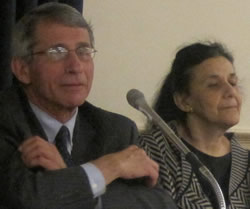Top NIH Infectious Disease Expert: More Research Could Bring About a “Functional Cure” for HIV/AIDS
HIV/AIDS experts call for increased funds for research at amfAR-co-sponsored briefing, with the hope of developing new treatments for people living with HIV and new prevention tools for those who are at risk of infection
For Immediate Release
Media Contact: Cub Barrett, Program Communications Manager, (212) 806-1602
NEW YORK, May 3, 2010—Dr. Anthony Fauci, the U.S. government’s top-ranking infectious disease expert, on Friday said at a Capitol Hill briefing co-sponsored by amfAR, The Foundation for AIDS Research, that a “functional cure” for HIV/AIDS was “eminently feasible” through research.

Dr. Anthony Fauci (left), director of the National Institute of Allergy and Infectious Diseases at the NIH, and Dr. Wafaa El-Sadr, director of Columbia University’s International Center for AIDS Care and Treatment Programs, spoke at the April 30 Capitol Hill briefing.
|
Fauci, director of the National Institute of Allergy and Infectious Diseases at the National Institutes of Health (NIH), said investments in research are needed to help scientists understand more about how the HIV virus works in the body, and that the NIH is conducting studies on how best to achieve a functional cure. Fauci also touted the role that research has played so far in finding successful treatments for people living with HIV during the nearly 30 years since the virus was identified.
“We went from a 26-week lifespan to a 40-plus [year] additional lifespan, and I don’t think that there’s anything that we can point to in biomedical research [that has translated] into more meaningful health outcomes than the therapies for HIV,” Fauci said.
The briefing, titled “AIDS Research at NIH: New Opportunities to Change the Course of the AIDS Epidemic,” also featured Dr. Jack Whitescarver, director of the NIH Office of AIDS Research; Dr. Wafaa El-Sadr, director of Columbia University’s International Center for AIDS Care and Treatment Programs and a former amfAR trustee; and Dr. Ada Adimora, a professor of medicine and epidemiologist at the University of North Carolina-Chapel Hill.
The speakers cited the importance of the NIH for the future of HIV/AIDS research, highlighting successes to date and challenges that remain, including updating and expanding prevention programming and developing better treatments for those living with HIV and AIDS. They also underscored the fact that AIDS research is benefiting other diseases and health conditions worldwide, such as malaria and tuberculosis, and stressed the need to continue investments to develop breakthroughs since 33 million people around the world are living with HIV/AIDS—and more are becoming infected every year.
“The urgency is not over. We have an emergency in this country and an emergency around the world as it relates to HIV/AIDS,” said El-Sadr, whose presentation was titled “Unfinished Business.” “There’s a need to continue an ambitious, innovative, courageous research agenda.”
The briefing was co-sponsored by amfAR; AVAC; the HIV Medicine Association; IDSA/HIVMA Center for Global Health Policy; San Francisco AIDS Foundation; and the Treatment Action Group (TAG) and was held in collaboration with U.S. Reps. Rosa DeLauro (D-CT), Barbara Lee (D-NY), and Elliot Engel (D-NY).
About amfAR
amfAR, The Foundation for AIDS Research, is one of the world’s leading nonprofit organizations dedicated to the support of AIDS research, HIV prevention, treatment education, and the advocacy of sound AIDS-related public policy. Since 1985, amfAR has invested more than $307 million in its programs and has awarded grants to more than 2,000 research teams worldwide.